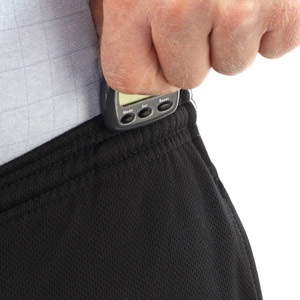
Fitness activity trackers have come a long way since Leonardo da Vinci sketched a rudimentary gear-and-pendulum pedometer to track the treks of 15th century Roman soldiers.
Experts predict their popularity will grow as they become more sophisticated.
Read: Competitive workouts among top 2014 fitness trends
"Two big changes to fitness trackers since last year is that more of them now support heart rate monitoring and several of them have smartwatch functionality," said Jill Duffy, a senior analyst at the computer magazine PCMag.com.
She said smartphone functionality means, for example, showing incoming text messages from one's smartphone on the tracker itself.
"The upcoming Apple Watch, which is due out in January, will be both a complete smartwatch and fitness tracker, and will include heart rate data," Duffy said.
84 million fitness tracking devices bought in 2013
Consumers bought an estimated 84 million fitness tracking devices in 2013, ranging in price from $49 (R 568) to $200 (R 2 316), according to the analyst group IHS technology.
It predicts that number will grow beyond 120 million by 2019.
"Even with all the options for fitness trackers, we're still early in the game," said Neal Pire, an exercise physiologist with the American College of Sports Medicine.
He said tracking information and storing it in the cloud for easy access helps some, but not all exercisers stay on track.
Not all exercisers stay on track
"There are people who work really well with keeping a food or exercise log," he explained. "Others are not only disinterested: they hate it."
Los Angeles-based trainer Shirley Archer agreed but added their use is not always long lasting.
"Surveys show that as of September 2013, one in 10 American adults wore a fitness tracker," said Archer, author of "Fitness 9 to 5."
But 30 percent of people who buy a device, no longer use it within six months.
Read: Home-based exercise programmes more effective
To select a tracker, Archer suggests considering three factors - how it is intended to be used, where it will be worn and how much data will be tracked.
She also said novices should begin with a simple model, establish a baseline, and try to gradually increase those levels.
Duffy envisions a time when trackers will focus more on overall health than exercise.
"Imagine if your doctor had access to your heart rate information over the last 60 days and could see when a change occurred?" she said.
Read: Weightlifting bad for eyes?
"That's why all these trackers are meaningful in the long run."
Read More:
Healthy lifestyle key to easing atrial fibrillation
Sleep apnoea may lower your aerobic fitness
Dangers of yoga
Image: Male hand attaching a pedometer to his track pants from Shutterstock




 Publications
Publications
 Partners
Partners










